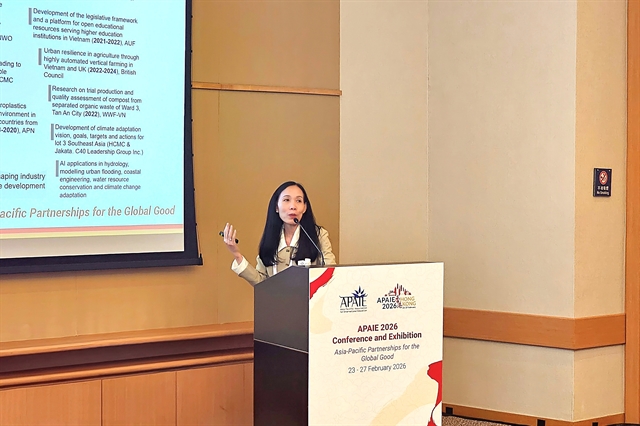 Business Beat
Business Beat

 |
| A business individual selling rice in Ninh Bình Province. Tax authorities are tasked with completing the database system for business households and individuals by April 2025. VNS/VNS Photo |
HÀ NỘI — Digital transformation in tax management is being promoted for business households and individuals in order to streamline their processes and reduce management costs.
The Ministry of Finance's General Department of Taxation has emphasised the importance of improving data systems to ensure comprehensive and accurate tax management.
Tax authorities are tasked with completing the database system for business households and individuals by the end of this month.
Additionally, efforts are underway to clean up and update the personal tax code database to ensure more effective tax collection and monitoring.
A critical aspect of the tax authorities' strategy is using big data to detect and address potential tax evasion.
This approach is especially important in sectors such as service industries and digital platform businesses, which have been identified as having higher rates of tax evasion.
The Deputy Director of the department, Mai Sơn, highlighted the importance of a scientific, data-driven approach in managing taxes for business households and individuals.
The tax sector is focusing on improving its tax management systems with greater efficiency and precision by using artificial intelligence (AI), big data and other technology innovations.
One of the key initiatives in this transformation is the development and expansion of the eTaxMobile application, which aims to make tax filing and management more accessible and efficient for taxpayers.
In addition to technology integration, the General Department of Taxation is committed to working closely with the business licensing authorities to address cases where business households and individuals fail to register their businesses, as they are required to by law.
Regular communication between the tax and licence authorities ensures timely implementation of tax management and registration requirements for businesses.
In particular, the tax authority is looking to collaborate more closely with freight forwarders and businesses providing ancillary services.
This coordination will help to better understand the true scope of business activities and improve tax management for various sectors.
By embracing technological advancements and refining policies, the department aims to create a more equitable and efficient tax system for business households and individuals, ultimately safeguarding State revenue and fostering a transparent business environment.
The current tax policies for business households and individual businesses is presumptive tax. It is a fixed tax for each month/quarter for individual business households.
These policies have been effective in supporting small-scale production and businesses, allowing individuals to prosper, reduce unemployment and create job stability.
However, with the rise of digital platforms and e-commerce, the need for more adaptive tax policies has become clear.
The rapid growth of digital commerce, services, and platform-based businesses—many of which are operated by business households and individuals—has highlighted the challenges faced by tax authorities. These new forms of business have created disparities in tax management.
The evolving market has made it essential for tax authorities to adjust their approaches to ensure a fair and transparent business environment, preventing tax policies from creating unequal conditions for different sectors of the economy.
The department's leadership has acknowledged the progress made in managing business household taxes, particularly through the use of big data.
In 2024, the revenue from business households and individual businesses reached VNĐ25.95 trillion (over US$1 billion), 20 per cent higher than the revenue collected in 2023.
However, the current tax management practices for business households and individual businesses still fall short of meeting the goals set by the Government. As such, the department is calling for more innovative tax management policies.
Particularly, there is an urgent need for breakthrough policies to address tax management challenges in sectors such as digital platforms, hospitality (restaurants and hotels) and service industries.
The rise of these sectors has led to an increase in tax evasion tactics, where individuals and businesses attempt to circumvent tax regulations, leading to significant revenue losses for the State.
In response, tax authorities are working on strategies to tighten enforcement, reduce evasion and ensure that all sectors contribute fairly to the national revenue. — VNS




